Harvesting Business in Hand-Shaping Boards
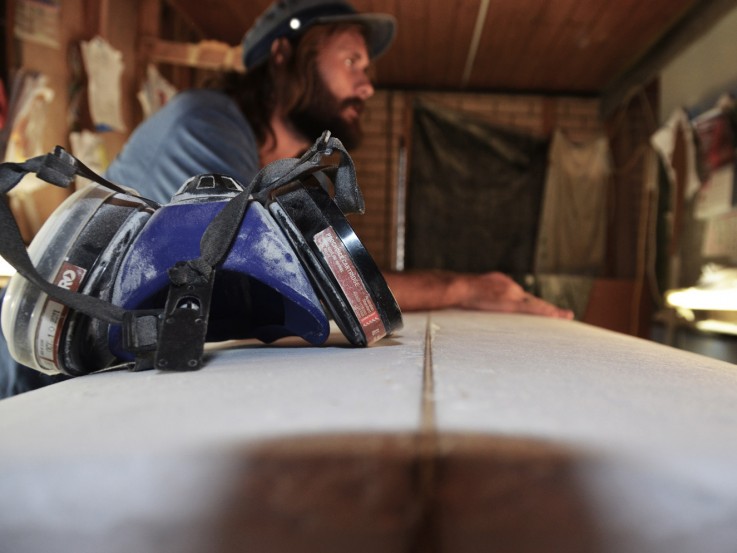
Jack Knight started shaping surfboards in Brookvale, Sydney in 1969, working with various brands, including Keyo, Shane, Bennett and Peter Ryan. In 1971, he founded Jack Knight Surfboards and has been hand shaping his own boards since then. Having grown up with a father who was so passionate about his work, it seemed inevitable that son Aaron would get involved in the family business. Aaron started glassing at age 20, learning the ropes from Jack, and after a three-year surfboard shaping apprenticeship he decided to take up shaping fulltime. Just over 12-months ago, Aaron initiated the Harvest brand, which specialises in alternative, retro boards and pays homage to the shapes and styles of the 1960s and 70s. We sat down with Jack and Aaron to learn about what it takes to make a career in hand shaping surfboards.
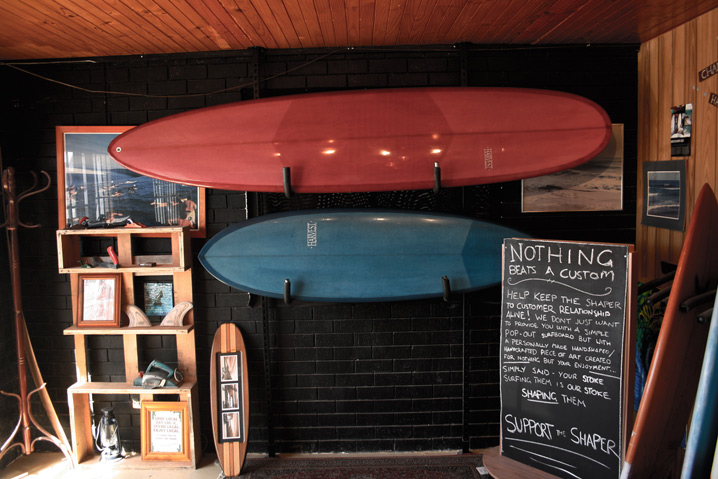
What makes a good hand shaper?
Jack: A lot of time and experience. It’s not about how many boards you can produce each week, it’s more about having a lot of knowledge about the boards you ride, how they feel and how they perform. I’ve been hand shaping boards for more than 43 years and I still shape boards that I surfed when I was younger. If something doesn’t work I don’t shape it.
Aaron: When it comes to hand shaping, a lot of the performance guys don’t really get it. They are more about a product and having the latest and greatest technology, which comes from a computer, so they aren’t going to appreciate something hand crafted that isn’t a throwaway object.
What is the best part about shaping boards (and running your own business)?
Jack: I love shaping as it’s all about creating stuff with my hands. I always joke that when I retire I want to shape boards. I could easily and very happily shape boards 10-hours a day for the rest of my life! As far as being your own boss, well there’s no one over your shoulder telling you what to do, which can be good and bad!
Aaron: I love the artistic side of it - creating unique, beautiful boards that are designed to last a lifetime.
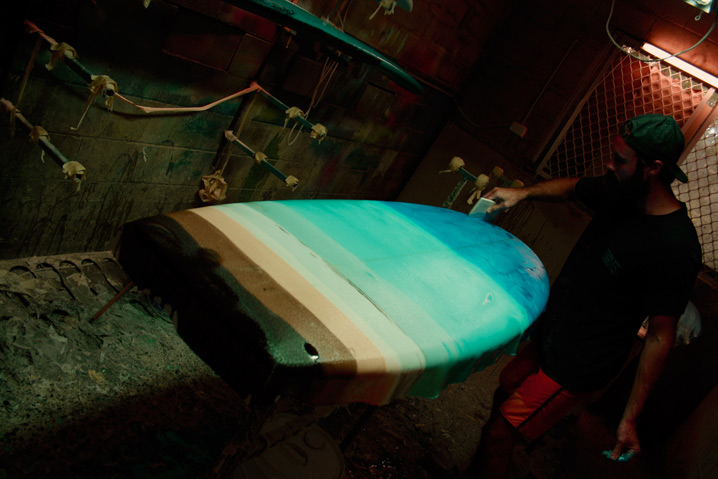
What is the hardest part?
Jack: Making a living, that’s the hardest part! Surfboards haven’t really gone up in price over the last 20 years but the cost of materials and the cost of living has. When I started working I was getting $25 a week and a surfboard cost $300 – that meant saving up to 10 pay cheques just to purchase a board! There is also still a stigma attached to shaping surfboards, people often wonder when you’re going to get a ‘real’ job.
Aaron: There’s a lot of propaganda and marketing around the surfing industry, particularly when it comes to products and retail. Unfortunately, it’s often not about how good the product is or how good a shaper you are but rather who’s promoting it. The industry isn’t geared to look after the small players.
“At times it feels like it has gone from making a bit of you, to just making a product.”
What lies ahead for the shaping industry?
Jack: It’s just going to get harder if we have to keep competing with cheap imports. People need to think more about who they are supporting and where they are putting their money. Sadly, a lot of people don’t care who is shaping their boards.
Aaron: The surfers and the shapers are the ones that started the whole industry and yet we’re now in a position where all the big clothing companies own the industry and push the direction of shaping. I’d like to see the whole industry turned on its head. More than anything, we probably need to look at more sustainable materials. I think that’s the future of shaping, trying to make those materials work in the water rather than something toxic. We need to move away from over-production and waste and invest in boards that are built to last and aren’t throwaway items. It’s a real cliché that surfers are meant to be all about the soul of the ocean and the environment yet the things sitting under us can completely stuff the environment!
It really just comes down to how much the big companies want to lead by example.
“If Kelly Slater got on an eco-friendly hemp board and started winning contests, which he probably could do, it would be the best thing for the industry!”
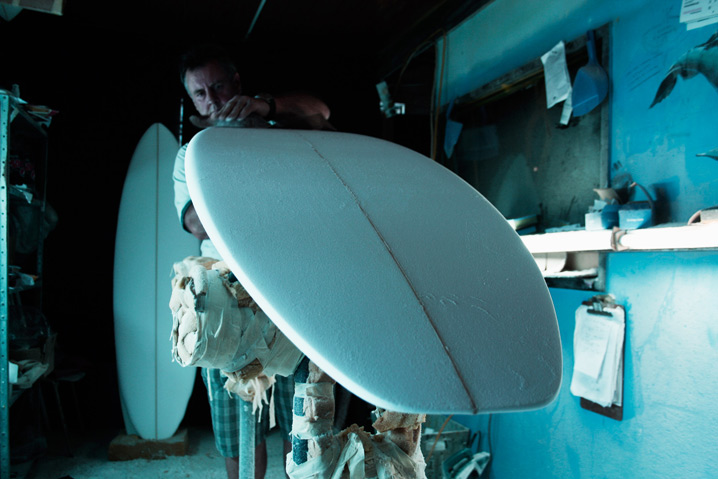
What advice would you give to anyone wanting to make a career from shaping boards?
Jack: Get into shaping for the love of it and for the lifestyle, don’t get into it for the money. You really need to think about whether you want to make boards commercially or just for the love of it. I’ve seen a lot of the big-name shapers who got into it only wanting to produce a dozen or so boards a week, make a decent living and go surfing but it got too big for them and now they’re having to keep up with mass production – it’s like running on a treadmill, if they stop they will go broke.
Aaron: Best advice I can give is don’t lose sight of why you wanted to get into it. A lot of guys get into it for the right reasons but they can lose sight of that.
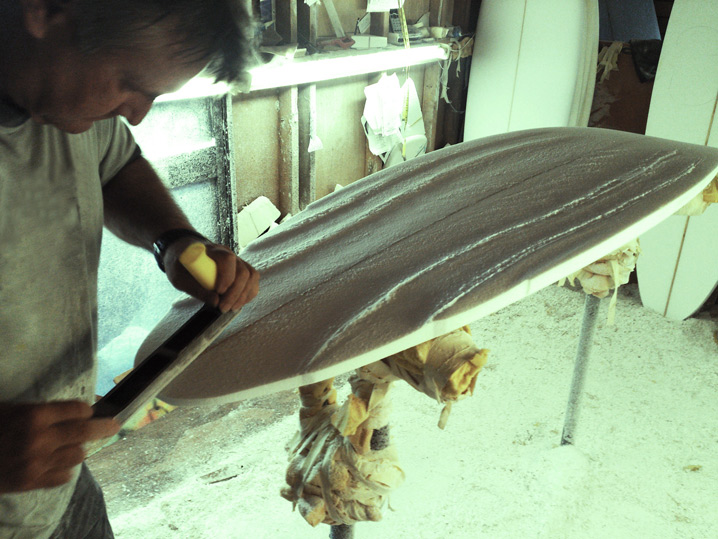
Where can we find you online?
| Web: | jackknightsurfboards.com.au harvestsurfboards.com |
| Instagram: | @harvestsurfboards |
Shapers Salary Survey
The latest Shapers Salary Survey brought to you by AKU Shaper and Shaperbuddy is completed, download the results by entering your details in the form below.
Posted by: Jaclyn Knight, on March 10, 2014
Categories: Interviews
Latest Posts
Craig Sims - White Horses & Surfing Life Publisher
Luke Kennedy - Editor of Tracks Magazine
Simon ‘Swilly’ Williams - Surf Photographer
Jarra Campbell - the Bondi Alchemist
Greg Gordon - Owner of CR Surf
Shayne Nienaber - Surf Photographer
Alexa Hohenberg - Owner of Still Stoked
Christine Deveney - TapaReef Owner & Creator
Russell Ord - Surf Photographer
Richard Kotch - Surf Photographer
Categories
Interviews
Articles
Videos
Press Releases
Quiz
Archive
December 2018
November 2018
October 2018
September 2018
August 2018
July 2018
June 2018
May 2018
April 2018
March 2018
February 2018
January 2018
November 2017
January 2017
December 2016
November 2016
October 2016
September 2016
August 2016
July 2016
June 2016
May 2016
April 2016
March 2016
February 2016
January 2016
December 2015
November 2015
October 2015
September 2015
August 2015
July 2015
June 2015
May 2015
April 2015
March 2015
February 2015
January 2015
December 2014
November 2014
October 2014
September 2014
August 2014
July 2014
June 2014
May 2014
April 2014
March 2014
February 2014
January 2014
December 2013
November 2013
October 2013
September 2013
August 2013
July 2013
June 2013
May 2013
April 2013
March 2013








